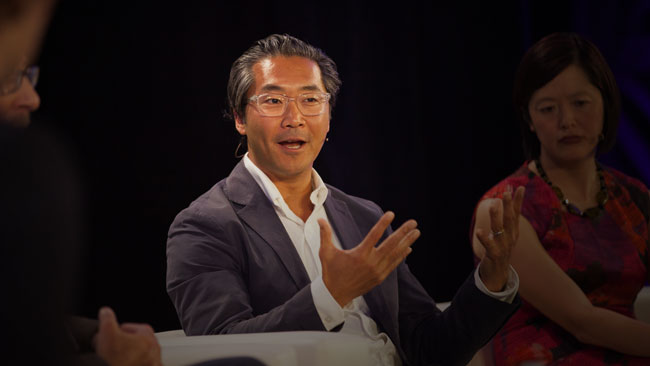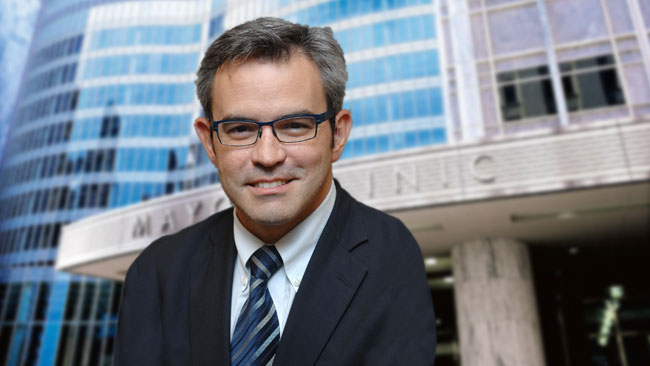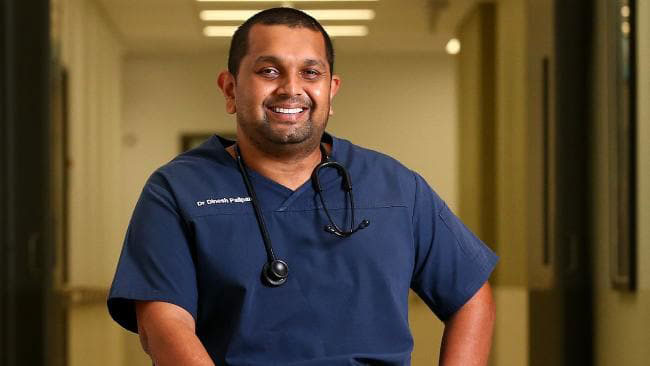| medicine x | ed
A MEDICAL EDUCATION CONFERENCE DESIGNED FOR EVERYONE
Stanford Medicine X | ED is a conference on the future of medical education at the intersections of people, technology and design.
As an Everyone Included™ program, it aims to place patients and caregivers at the center of medical education, in partnership with medical learners and teachers.
We challenge the belief that medical education is domain exclusive to health care practitioners, but instead benefits from interdisciplinary co-creation with all relevant health care stakeholders.
It is the culmination of six years of co-creation with patients, caregivers, providers, technologists, and researchers at Stanford Medicine X that has resulted in a series of design and leadership principles intended to bring diverse groups of people together on equal footing to collaborate and co-create the future of health care.
| keynote speakers

BON KU, MD
Assistant Dean for Health and Design
Thomas Jefferson University

VICTOR MONTORI, MD
Professor of Medicine
Mayo Clinic

DINESH PALIPANA, MD
Resident Physician, Emergency Medicine
Gold Coast University Hospital, Australia
Bon Ku, MD, MPP is the Assistant Dean for Health and Design and an Associate Professor at the Sidney Kimmel Medical College at Thomas Jefferson University. He is a practicing emergency medicine physician and the founder/director of the first design thinking program in a medical school. His innovative program that teaches future physicians to apply human-centered design to healthcare challenges has been highlighted in the The New York Times, New England Journal of Medicine Catalyst, The Huffington Post, Next City and Architectural Digest. Dr. Ku has spoken widely on the intersection of health and design thinking (TEDx, South by Southwest, Mayo Clinic Transform) and serves on the Design and Health Leadership Group at the American Institute of Architects. He received the Health Care Innovators Award from the Philadelphia Business Journal and made the Best of Philly list in Philadelphia Magazine. Dr. Ku holds a master’s degree in Public Policy from Princeton University, MD from Penn State and a bachelor’s degree in Classical Studies from the University of Pennsylvania. You can find Bon on Twitter discussing design, health and technology: @bonku.
Victor Montori, MD, MSc, works at the Mayo Clinic as a diabetes doctor. He graduated medical school in his hometown of Lima, Perú, and completed postgraduate training at Mayo Clinic in the U.S. and at McMaster University in Canada. Considered “a patient’s doctor,”, Montori received the Karis Award, a patient-nominated recognition for his compassionate care.
A researcher in the science of patient-centered care, Montori and his colleagues have authored over 580 research articles. At 39, he was promoted to professor of medicine. Today, Victor is one of the most cited clinical researchers in the world.
In 2016, Victor founded The Patient Revolution, a nonprofit organization to advance careful and kind patient care for all.
Dinesh was the first quadriplegic medical intern in Queensland, and the second person to graduate medical school with quadriplegia in Australia.
Dinesh earned a Bachelor of Laws (LLB), prior to completing his Doctor of Medicine (MD) at the Griffith University. Halfway through medical school, he was involved in a catastrophic motor vehicle accident that caused a cervical spinal cord injury.
After graduating from medical school Dinesh faced significant challenges in gaining an internship. As a result of the barriers medical students and doctors with disabilities face, he has advocated for an inclusive medical profession. Dinesh became a founding member of Doctors with Disabilities Australia.
Dinesh is currently a resident in emergency medicine at the Gold Coast University Hospital. He is an Associate Lecturer at the Griffith University. Dinesh was the Gold Coast University Hospital’s representative in the Australian Medical Association Queensland’s Council of Doctors in Training in 2017. He is a member of the scientific advisory committee of the Perry Cross Spinal Research Foundation.
Dinesh offers the following remarks in advance of his Medicine X keynote
Harvey Cushing said that, “I would like to see the day when somebody would be appointed surgeon somewhere who had no hands, for the operative part is the least part of the work.”
That day is now.
Medicine is a profession that has long expanded not just the boundaries of science, but human achievement. In an era where humanity is coming together by destroying prejudices of colour, gender and physical attributes; the time is ripe for our profession to begin reflecting the society that we serve.
The medical community, in its broad scope, has a place for the passion of even the most diverse medical practitioner. It is this diversity that will strengthen the profession to solve humanity’s problems for the future.
It is more than possible to make medical education, and the profession, inclusive. Now is the time.
| about the 2018 program
Join a global community organized around innovating the future of medical education through a framework of mutual respect and inclusivity we call Everyone Included™. Receive updates when we launch our call for presenters, announce our program and open registration.

Our focus at Medicine X | ED 2018 will be to help educators create disruption in medical education through partnership with patients and interprofessional collaboration. Our goal this year is to focus on creating opportunities for educators from around the world to share their expertise with each other, and for networks of expertise within our Medicine X community to form around important areas of patient partnership, inter-professional collaboration, and addressing gaps in medical curricula at the intersection of people, technology and design.
CO-CREATION: WORKING TOGETHER TO ADVANCE MEDICAL EDUCATION
How might patients, interprofessional care teams and medical educators work together to co-create the educational system that will nurture a compassionate, and patient-centered health care system that best meets the needs of our communities? This year’s Medicine X | ED will highlight advanced educational learning technologies, new innovative pedagogical methods, and most importantly workshop practical skills educators themselves can learn and take back with them to implement at their home institutions to better meet students where they are and improve how we teach and learn in health care today.
A FOCUS ON PERSONAL CONNECTIONS AND AN INTIMATE STAGE
We are pulling in the focus of our Spring event and returning to the Quadrus Center across from the Stanford Linear Accelerator Center (SLAC), the site of our inaugural Medicine X | ED event. Here, under one-hundred year old oak trees and intimate small classroom settings, we plan to re-focus Medicine X | ED as an event for medical educators working in the trenches to disrupt medical education. We aim to give you tangible skills and quality networking opportunities to elevate your transformative ideas to the next level.
6,000
Global program participants
142
ePatient Scholars trained since 2011
69
Countries represented
27,500,000
People reached globally
| our 2018 program tracks
About Medicine X | ED
Medicine X | ED will focus on the future of medical education in the new Millennium, the role technology and networked intelligence might play in driving educational innovation, the new challenges facing health care education in the new Millennium, as well as the need to change the culture of medical education to be more patient-centered, participatory and patient-safety-focused. In order to provide a more intimate and personalized experience, the conference will take place in a smaller venue this year, at the Quadrus Center across from the Stanford Linear Accelerator Center (SLAC).
Why Medicine X | ED?
We believe in order to create a medical education system that best supports patient-centered health care, we must first build a community of like-minded individuals who believe in transforming the medical education process. We aim to activate these individuals to form partnerships that will result in significant new innovations in bringing PCOR and CER to the forefront of medical practice. The centerpiece of this community is, Stanford Medicine X | ED, an academic medical conference focused on the future of patient-centered medical education.
This meeting will be one of the major venues for medical educators focused on innovation through patient and interprofessional partnership to present and publish their work and to network with a diverse audience of health care providers, patients, researchers, caregivers, technologists, medical students, and residents.
Four Type of Tracks
Instructional Technologies and Engagement Learning Design
How are emerging technologies and novel engagement strategies aligned to drive innovation in medical education for today’s Millennial learners? How might we thoughtfully apply technology and novel engagement learning design strategies to innovate medical education? Areas of focus for this track might include:
- Presentation techniques to optimize engagement and instruction, such as animation and audio and visual techniques (e.g. Keynote, Prezi)
- Creating audio podcasts using professional audio techniques
- Using mobile apps to create instructional content
- 3D printing for medical education
- Surveying, polling, data collection, and analysis
- Editing videos and images
- Curriculum design that engages all stakeholders in medical education
- Engaging learners in ways that appeal to their unique learning needs
- Just-in-time learning
- Engagement with a diversified audience
- The power of storytelling in medical education
- Progress monitoring and strategies to engage and invest learners in their educational growth
- Patients as educators
- Applying design thinking principles to education
- Online, distance, and blended learning
Gaps in Medical Education
How might we begin to identify and address important gaps in medical education? How is medical training today falling short of preparing students and researchers to best care for patients and uncover new scientific discoveries in partnership with all relevant stakeholders in health care? Areas of focus for the Gaps in Medical Education track might include:
- Recognizing, identifying, and addressing gaps in medical education
- Underserved communities in healthcare
- Mental health issues and medical education
- Patients as educators in medical education
- Cost transparency in healthcare
- Bridging data with storytelling
- Reducing preventable harm and improving patient safety
- Interdisciplinary learning
- Lifelong learning and rethinking continuing medical education (CME)
Patient-centered Outcomes Research and Clinical Effectiveness Research (PCOR and CER)
How can PCOR and CER reshape the educational landscape for medical education? How are new modalities for collaboration and engagement of patients, collective intelligence and open access to information reshaping the learning environment?
Areas of focus for the PCOR and CER track might include:
- Recognizing, identifying, and addressing gaps in knowledge in comparative clinical effectiveness research that centers on the outcomes that matter most to patients and those who care for them
- Novel curricula that aims to teach patients and providers who to use findings from comparative effectiveness research to make informed decisions about clinical care using a participatory shared decision making model
- Measuring effectiveness of teaching PCOR and CER in medical education and transfer of knowledge to practice
- Methods to involve all stakeholders, including patients and caregivers, in medical education and dissemination of patient-centered outcomes research into participatory decision making and clinical practice
Everyone Included™
Our Everyone Included™ track is designed to include all health care stakeholders–including patients and caregivers–in medical education. Patients will be included as teachers and students in medical education where they will learn about the basic principles of PCOR, how to become better advocates, be engaged, engage others, and be partners on a research team.
Areas of focus for the Everyone Included™ track might include:
- Recognizing, identifying and addressing inclusivity of under-heard voices in medical education, such as patients, caregivers, and learners themselves
- Co-creation and co-implementation of new medical curricula using Everyone Included™ teams (e.g. patients, caregivers, technologists, learners themselves)
- Improving existing curricula through inclusivity of under-heard voices in medical education using a co-creation model
Type of Presentations
The following types of submissions will be accepted for presentation at Stanford Medicine X:
Oral Presentations
Oral presentations offer presenters an opportunity to provide a presentation of your work to a large breakout audience. Presentations are 10-12 minutes in length. Oral presentations are organized into theme sessions, and each session will have a designated moderator.
Panel Presentations
These 45 minute panel sessions provide an opportunity to engage in a discussion around novel topics of medical education. We encourage panels that are composed of Everyone Included™ stakeholders (e.g. learners, educators, interdisciplinary contributors, patients and caregivers when possible).
Learning Labs
These 45 minute classroom sessions provide presenters an opportunity to lead a group of learners through a “how-to” style tutorial on novel teaching methods that incorporate thoughtful use of technology to engage the Millennial learner.
Workshops
These longer 90 minute sessions provide presenters with an opportunity to delve deeply into a topic to share unique expertise with a diverse group of passionate Medicine X | ED delegates. Workshops are limited to a maximum of 30-35 people.
Registration for Stanford Medicine X | ED 2018
Special registration rates will be available to individuals accepted to present at Stanford Medicine X | ED 2018. All presenters must register for the Stanford Medicine X | ED conference. Due to the limited size of our venue and the unique nature of our patient-partnered event, a limited number of low priced rebel rate tickets for 2018 are available. Ticket prices reflect only a fraction of the total cost required to produce each Medicine X event.






